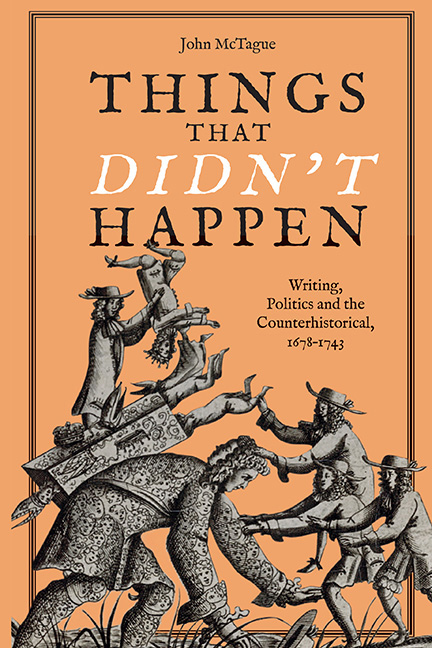Book contents
- Frontmatter
- Dedication
- Contents
- List of Illustrations
- Acknowledgements
- List of Abbreviations
- Introduction
- I Fabrications
- II Failures
- III Speculations
- IV The Dunciads
- 7 Living in Counterhistory: The Dunciads as Mock-Prophecy
- 8 The Indifference of the Dunces: Agency in the Dunciads
- 9 Gravitation, Providence, and Theories of History in the Dunciads
- Conclusion: Events that Didn't Happen
- Bibliography
- Index
7 - Living in Counterhistory: The Dunciads as Mock-Prophecy
from IV - The Dunciads
Published online by Cambridge University Press: 09 October 2019
- Frontmatter
- Dedication
- Contents
- List of Illustrations
- Acknowledgements
- List of Abbreviations
- Introduction
- I Fabrications
- II Failures
- III Speculations
- IV The Dunciads
- 7 Living in Counterhistory: The Dunciads as Mock-Prophecy
- 8 The Indifference of the Dunces: Agency in the Dunciads
- 9 Gravitation, Providence, and Theories of History in the Dunciads
- Conclusion: Events that Didn't Happen
- Bibliography
- Index
Summary
POPE's longest (and longest-running) satire began in 1728 as a defensive attack in three books, bewailing the degradation of culture and those he held chiefly responsible for it: the dunces, acolytes of the goddess, Dulness, almost all of whom were based on ‘real’ people. It expanded into the Dunciad Variorum of 1729, which named the hero, Tibbald, or Lewis Theobald, and the other dunces that he ruled over as king. The Variorum incorporated into its ample satirical apparatus material from the protestations and counterattacks that Pope's targets had rushed into print in response to the original version of the poem. In 1742 appeared the New Dunciad, pretending to be a newly discovered manuscript of a fourth book of the satire, wider in its scope and darker in tone. In 1743, The Dunciad in Four Books joined this new fourth book with the earlier three, and introduced a new ‘hero’, Bays, or Colley Cibber, amidst a raft of smaller revisions smoothing over the joins and shifting satirical emphasis. Lines at or near the end of all versions of this poem describe an inverted apocalypse, as the goddess Dulness does not lift a veil but releases a curtain, and ‘universal darkness’ either ‘covers’ or ‘buries all’. This descending darkness is also the primeval obscurity from which civilisation emerged: as the poem also makes clear, this is really a restoration of the ‘mysteries’ of ‘Chaos’ and ‘eternal night’ (1743 IV.1–5).
The Dunciads attack novelty and modernity – the commodification of literature; freethinking; the pedantry of modish collectors – while insisting that such fripperies are of ancient, even primeval, date (as we will see, this is not the only kind of temporal sleight of hand at work in these texts). As the rest of this book seeks to establish, the chaos that envelopes civilisation at the close of Pope's great satire is, in some quite precise ways, akin to the ‘convenient order’ to which the freethinker Lysicles indifferently submitted. For Pope, as for Berkeley, this is no order at all. The Dunciads are studies in inertia: in things failing to happen.
- Type
- Chapter
- Information
- Things that Didn't HappenWriting, Politics and the Counterhistorical, 1678–1743, pp. 183 - 206Publisher: Boydell & BrewerPrint publication year: 2019



